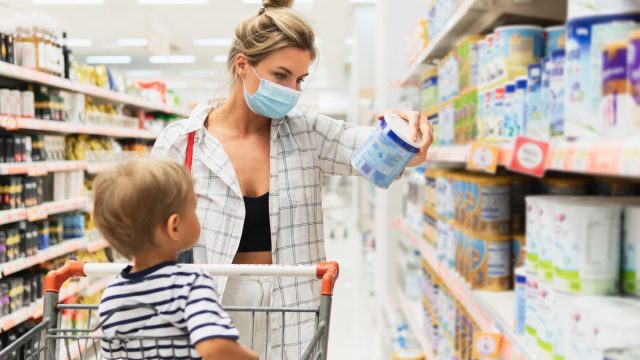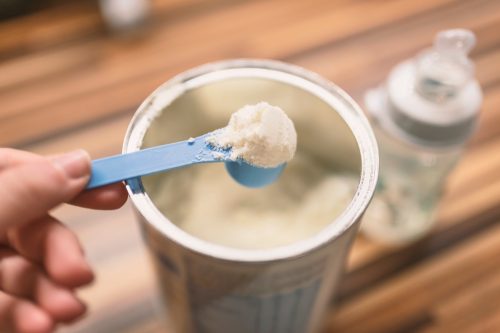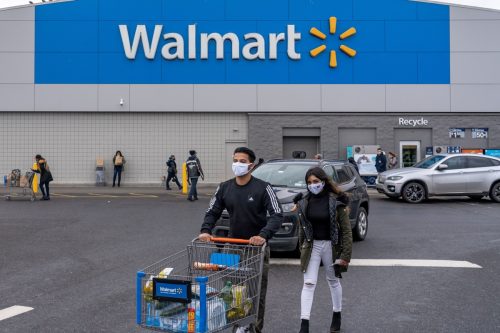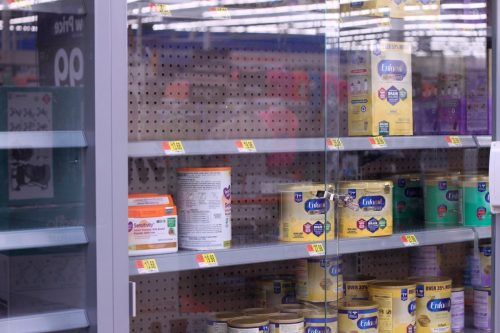This Is How Much Walmart, CVS, and More Are Restricting Baby Formula Now

If you’ve tried to find baby formula at the store recently only to be met with empty shelves, you’re hardly alone. Parents across the U.S. have been talking about how hard it is to find this product at local stores or online, with some shoppers saying they’ve had to go to a number of different retailers to find any at all. But if you hit the jackpot and find a store with plenty of baby formula available, don’t expect to be able to stock up. As a result of the nationwide shortage, major retailers have started restricting how much baby formula customers can buy at one time. Read on to find out how Walmart, CVS, and other stores are limiting shoppers’ purchases.
READ THIS NEXT: Walmart and Walgreens Are Under Fire for Selling This to Shoppers.
The baby formula shortage is continuing to get worse.

The U.S. has been dealing with a baby formula shortage for some time now, but it has only gotten worse over time. Analytics company Datasembly reported that 31 percent of the most popular baby formula brands were out of stock nationwide in early April, according to The Wall Street Journal. Just two weeks later, this rate had gone up to 40 percent for the week of April 24.
Normally, researchers say less than 10 percent of popular baby formula brands should be out of stock, but the industry is now facing a massive shortage which was initially caused by COVID-related supply chain issues. The problem was exacerbated in Feb. 2022 when one of the biggest formula manufacturers, Abbott Laboratories, voluntarily recalled some of their products and closed a manufacturing plant in Sturgis, Michigan. The company made this decision after the U.S. Food and Drug Administration (FDA) started investigating consumer complaints related to the hospitalization of five infants and deaths of two others after being fed powdered baby formula made at the Sturgis plant.
Retailers have started limited purchases of this product.

As a result of the worsening baby formula shortage, many different retailers across the U.S. have started restricting purchases of this product. On April 12, a spokesperson for Walmart told The Wall Street Journal that shoppers are only allowed to buy five containers of formula each day at the retailer’s stores in most states across the U.S., at the request of the FDA.
Both CVS and Walgreens are limiting customers to just three baby formula products per purchase now as well, according to The Wall Street Journal. On May 8, The New York Times also reported that Target has confirmed there is currently an online purchasing limit of just four items, but no in-store limit.
Costco, on the other hand, has not made a statement on its restrictions, but there are various caps on formula listed on its website, according to the newspaper.
RELATED: For more up-to-date information, sign up for our daily newsletter.
Experts recommend parents try different things to secure baby formula right now.

If you can’t find baby formula at the store, there are a number of different things you can try doing. Steven Abrams, a pediatrics professor at the University of Texas at Austin, told The Wall Street Journal that he advises parents try shopping beyond big national chains at smaller stores they might not normally think to stop at. If that doesn’t work, he recommends asking your pediatrician’s office, which might have samples they can give you.
But you can also try switching formulas. Bridget Young, an assistant professor at University of Rochester Medical Center, told the newspaper that most babies don’t have health issues that make it unsafe for parents to switch formula brands. She does suggest, however, that parents check to make sure the ingredients are the same to avoid causing an upset stomach. If you aren’t sure which formula to switch to or your baby needs specialty formula, Young said should check with your baby’s doctor first.
Officials say they’re working to fix the problem.

The baby formula shortage has worried parents and advocates, but hopefully there’s an end in sight. During a May 9 briefing, White House press secretary Jen Psaki said that the FDA is “working around the clock” to address the shortage. “The FDA, it is not just their responsibility in their view to ensure that we’re meeting our obligations to protect Americans—it is also their obligation to take steps to make sure supply can be met when they take these steps,” she explained.
According to Psaki, this includes the FDA working with major infant formula manufacturers to ensure that product lines be increased, and working with the entire industry to optimize supply lines, product sizes, and prioritize the most-needed product lines. Abbott has confirmed that it is working to increase Similac production at other FDA-registered facilities, as well as shipping formula from Europe by air, according to The Wall Street Journal.
But an Abbott spokeswoman also told the newspaper on May 6 that although the FDA detected Cronobacter sakazakii, a bacteria that can be deadly in infants, at the Sturgis plant, they did not find it in Abbott’s products. The company believes the formula made at this plant “is not likely the source of infection in the reported cases and that there was not an outbreak caused by products from the facility.” Now, the manufacturer says it is working with the FDA to restart production at the Sturgis plant as well.
READ THIS NEXT: Publix Is Pulling This Popular Product From Shelves, Effective Immediately.